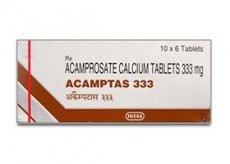Medical expert of the article
New publications
Preparations
Acamprosate
Last reviewed: 03.07.2025

All iLive content is medically reviewed or fact checked to ensure as much factual accuracy as possible.
We have strict sourcing guidelines and only link to reputable media sites, academic research institutions and, whenever possible, medically peer reviewed studies. Note that the numbers in parentheses ([1], [2], etc.) are clickable links to these studies.
If you feel that any of our content is inaccurate, out-of-date, or otherwise questionable, please select it and press Ctrl + Enter.

The drug Acamprosate is a drug that affects the nervous system and is part of the pharmacological group of neuroleptics that inhibit GABA receptors. ATC code - N07B B03.
The drug is produced by Lipha Pharmaceuticals (France) and Merck KGaA (Germany).
 [ 1 ]
[ 1 ]
Indications Acamprosate
The drug Acamprosate is recommended for use in complex therapy of various degrees of alcohol dependence (to support the refusal to drink ethanol) and in the treatment of chronic alcoholism. The drug should be taken after a special course of detoxification of the body and simultaneously with psychotherapy of addictions.
Warning! This drug does not eliminate or reduce withdrawal symptoms.
Pharmacodynamics
The active substance of the drug Acamprosate is a derivative of propanesulfonic acid (3-acetamidopropane-1-sulfonic acid or N-acetylhomotaurinate calcium) - it inhibits glutamatergic neurotransmission due to its structural similarity to the endogenous neurotransmitter gamma-aminobutyric acid (GABA).
The pharmacodynamics of the drug have not been fully elucidated, but presumably, due to the content of Ca 2+, Acamprosate inhibits metabotropic N-methyl-D-aspartate receptors of the main excitatory neurotransmitter of the central nervous system, L-glutamate.
The drug can also have a neuroprotective effect: the effect on calcium channels activates a number of enzymes (phospholipases, endonucleases, proteases) and, thus, helps protect nerve cells from excitotoxicity caused by excessive stimulation of neurotransmitters by ethanol.
Pharmacokinetics
According to the manufacturers, after taking Acamprosate orally, the process of biotransformation of the drug in the liver does not occur, and bioavailability does not exceed 11%.
Acamprosate is excreted from the body by the kidneys with urine. For this reason, special attention should be paid to the administration of the drug in cases of renal dysfunction (creatinine clearance below 50 ml/min).
Dosing and administration
Acamprosate is prescribed for oral administration in a dosage based on the patient's body weight: for patients weighing over 60 kg, the daily dose is 6 tablets of 333 g - two tablets three times a day (after or during meals). For patients weighing less than 60 kg, the daily dose is 4 tablets of 333 g (2 tablets are taken in the morning, 1 tablet in the afternoon and evening). Treatment can last from three months to a year.
Use Acamprosate during pregnancy
Use during pregnancy and lactation is contraindicated (category C).
Side effects Acamprosate
Side effects of the drug Acamprosate manifest themselves in the form of symptoms such as headache, epigastric, joint and muscle pain; nausea, vomiting, diarrhea, constipation, flatulence; skin rashes, peripheral edema; increased heart rate, shortness of breath, fainting; increased appetite, weight gain; flu syndrome; decreased libido, insomnia, amnesia, mental disorders, tremor, visual and taste abnormalities.
 [ 20 ]
[ 20 ]
Attention!
To simplify the perception of information, this instruction for use of the drug "Acamprosate" translated and presented in a special form on the basis of the official instructions for medical use of the drug. Before use read the annotation that came directly to medicines.
Description provided for informational purposes and is not a guide to self-healing. The need for this drug, the purpose of the treatment regimen, methods and dose of the drug is determined solely by the attending physician. Self-medication is dangerous for your health.

